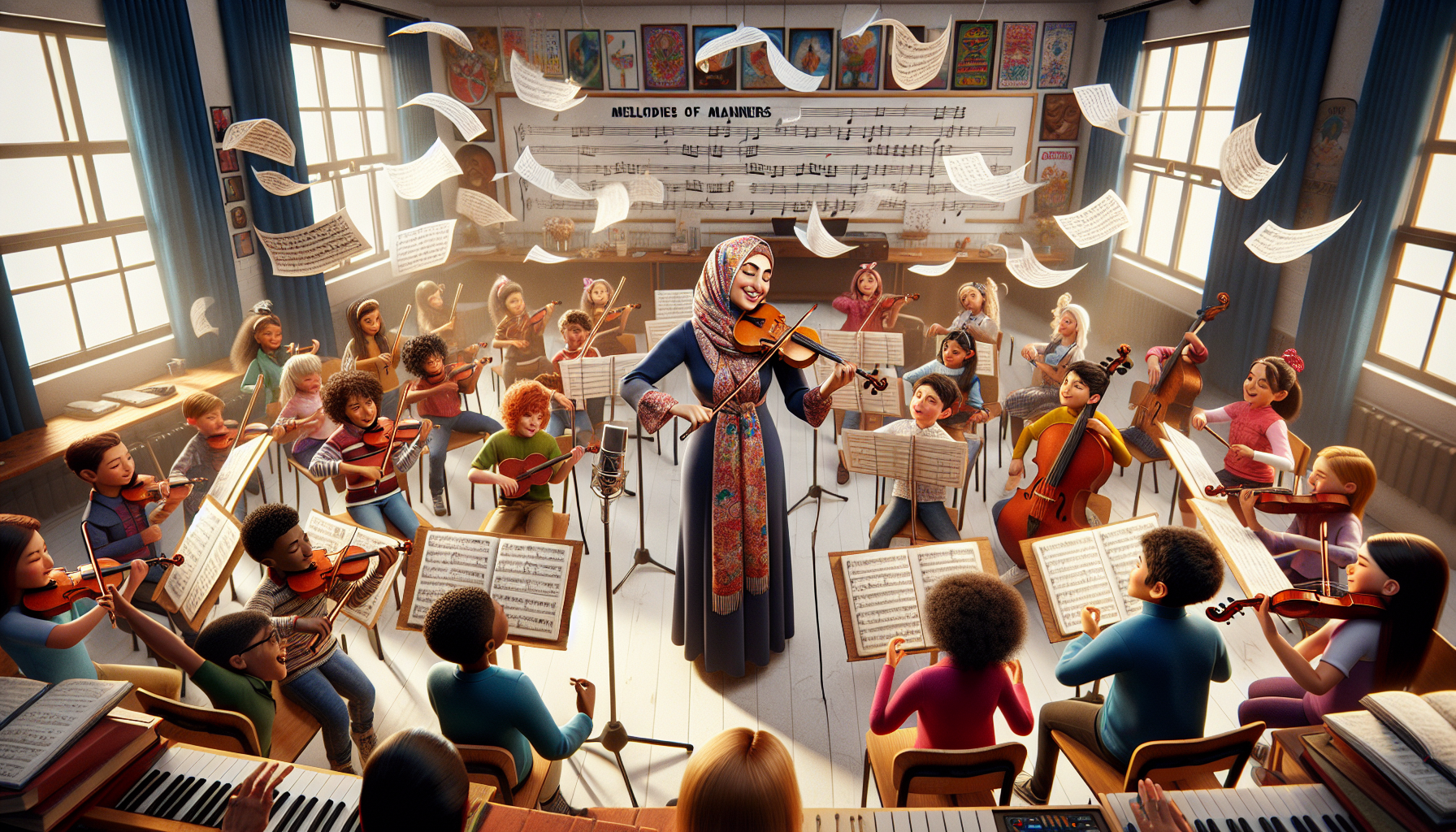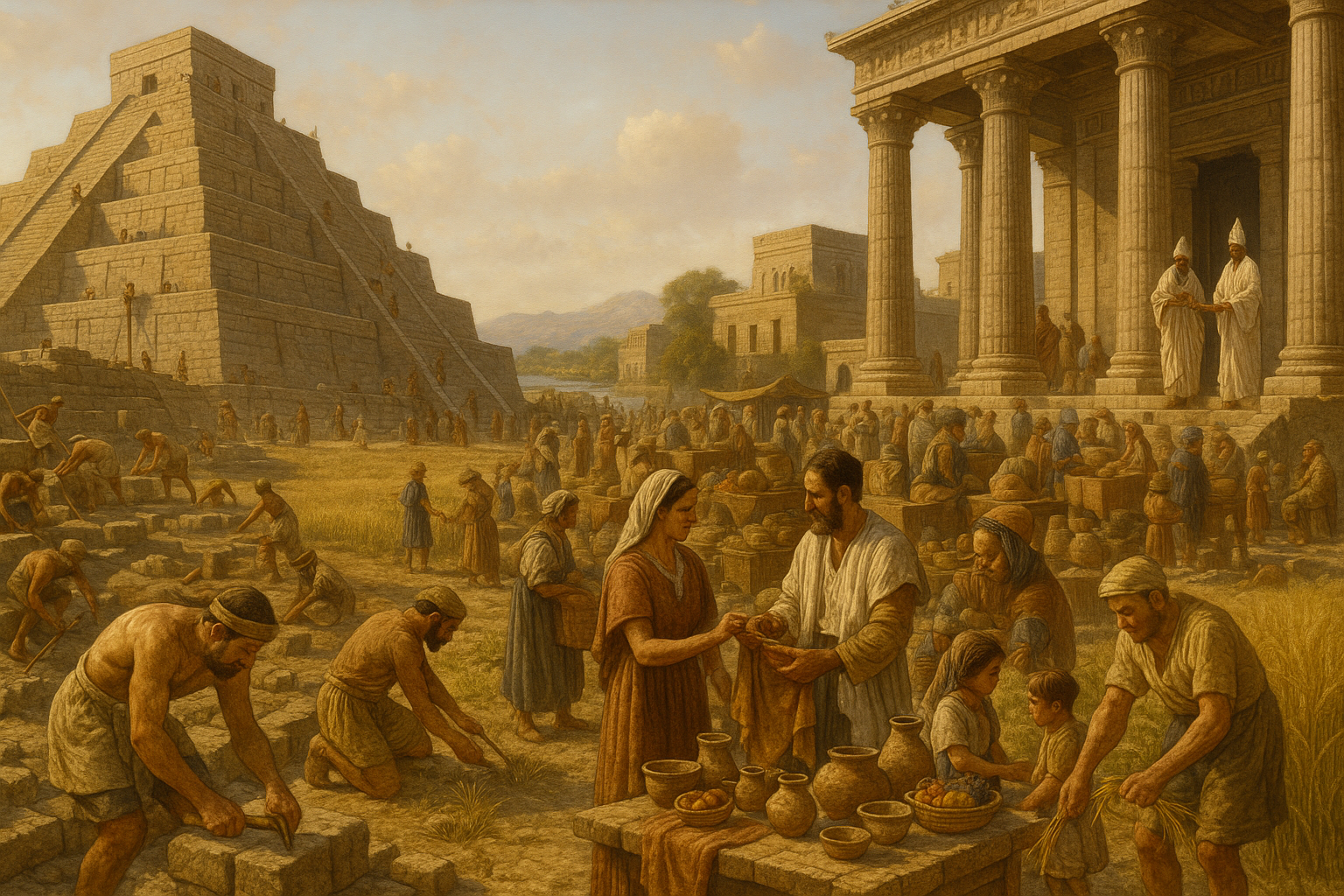In a world that often seems cacophonous and discordant, the power of music to serve as both a universal language and a cultural compass is nothing short of miraculous. 🎶 Music transcends borders, age, and even time, resonating with the very essence of what it means to be human. But beyond its ability to entertain and inspire, music holds a more subtle, yet equally profound, capability: it teaches us the social rules that help us navigate our complex world. Welcome to the melodious journey of understanding how music serves as a conduit for social harmony and mutual respect, setting the stage for a more cohesive society.
From the rhythmic chants of ancient tribes to the sophisticated symphonies of the classical era, and even to today’s chart-topping hits, music has been a silent yet powerful teacher of social norms and values. Imagine walking into a jazz club where the seamless improvisation between musicians is not just a display of talent, but also a lesson in communication, listening, and cooperation. Or consider a traditional folk song that tells stories of community, identity, and moral lessons, passed down through generations as a cultural touchstone. Throughout this article, we will explore how different genres and musical traditions impart social rules and why this is crucial for fostering a harmonious world.
In the coming sections, we will delve into the intricate relationship between music and societal values, examining how melodies can subtly educate us about manners, empathy, and collaboration. We’ll look at case studies from various cultures, analyze the psychological impact of music on behavior, and discover the ways in which music can be a tool for social change and unity. Whether you’re a musician, a music lover, or simply someone interested in the cultural fabric of our world, this exploration promises to enlighten and inspire. So, tune your senses, open your mind, and prepare to uncover the melodies of manners that hold the promise of a more harmonious world. 🌍
The Role of Music in Social Education
Music has been a cornerstone of human culture for millennia, acting not only as a form of entertainment but also as a powerful tool for social education. From lullabies that teach children the rhythms of language to folk songs that pass down stories and values, music plays a critical role in shaping social norms and behaviors. It teaches us about empathy, cooperation, and communication, facilitating a more harmonious world.
The educational power of music lies in its ability to transcend spoken language, reaching people across different cultures and backgrounds. It can be used to convey complex ideas about social etiquette, respect, and understanding in ways that are accessible to people of all ages. This makes music an invaluable resource for educators and parents seeking to instill positive social behaviors in young minds.
In schools, music education often includes lessons on cultural appreciation and history, helping students to understand the diversity of the world around them. By studying music from different cultures, students learn to appreciate and respect different perspectives, fostering a sense of global citizenship. Moreover, group activities like choirs and bands teach important social skills such as teamwork, responsibility, and leadership.
Case Study: Teaching Empathy Through Music
A compelling example of music’s role in social education can be found in programs that use music therapy to teach empathy to children with autism. These programs use musical activities to help children recognize and express emotions, both in themselves and in others. By associating musical tones with emotions, children learn to identify feelings like happiness, sadness, and anger, leading to improved social interactions.
Research has shown that these programs can significantly enhance the social skills of children with autism, enabling them to better understand and respond to the emotions of others. This demonstrates the profound impact that music can have in teaching empathy and understanding, essential components of a harmonious society.
For an in-depth look into how music therapy works in practice, watch this informative video: “The Power of Music Therapy” by Music Channel. 🎵
Music Genres and Their Social Messages
Different music genres carry unique social messages and teach distinct social rules, reflecting the diversity of human experience. These genres serve as vehicles for conveying cultural values and societal expectations, influencing the way we interact with one another.
Classical Music: Order and Precision
Classical music, with its emphasis on structure and harmony, teaches the value of order and precision. The discipline required to perform a classical piece can translate into a respect for rules and the importance of following instructions in everyday life. Classical compositions often explore themes of beauty, tragedy, and triumph, prompting listeners to reflect on these universal human experiences.
Folk Music: Community and Tradition
Folk music, on the other hand, is deeply rooted in community and tradition. It often tells stories of historical events, cultural beliefs, and social customs, preserving the heritage of a community. By engaging with folk music, individuals can learn about the importance of community values and the role of tradition in maintaining social cohesion.
| Genre | Social Message |
|---|---|
| Classical | Order, discipline, beauty |
| Folk | Community, tradition, storytelling |
Check out the table above to compare the different social messages conveyed by these music genres. 🎶
The Influence of Music on Social Movements
Music has long been a catalyst for social change, serving as an anthem for movements that seek to challenge the status quo and advocate for a better world. From civil rights anthems to protest songs, music has the power to inspire action and unite people around a common cause.
Protest Music: Voices for Change
Protest music has played a pivotal role in many social movements, providing a powerful platform for expressing dissent and demanding change. Songs like Bob Dylan’s “The Times They Are A-Changin'” and Marvin Gaye’s “What’s Going On” have become iconic for their ability to articulate the hopes and frustrations of their times.
These songs often address issues of inequality, injustice, and human rights, encouraging listeners to reflect on societal challenges and consider their role in creating a more equitable world. By amplifying marginalized voices, protest music can inspire collective action and drive meaningful change.
Global Impact: Music Uniting Cultures
Music’s impact extends beyond national borders, with global music movements fostering cross-cultural understanding and collaboration. Initiatives like Playing for Change bring together musicians from around the world to create music that transcends cultural barriers, promoting peace and unity.
- Encouraging empathy and cooperation across cultures
- Highlighting shared human experiences
- Fostering global citizenship and solidarity
Explore how music can unite cultures and promote a harmonious world by watching this video: “Playing for Change: Songs Around The World” by Playing For Change. 🌍🎤

Conclusion
Creating a world where harmony and understanding reign might sound like an ambitious endeavor, yet through the powerful medium of music, this dream is not just plausible—it’s happening. The article “Melodies of Manners: Music That Teaches Social Rules for a Harmonious World” explored the multifaceted role that music plays in shaping social norms and teaching vital societal values. From its capacity to foster empathy and collaboration to its unique ability to transcend cultural and linguistic barriers, music is an invaluable tool in promoting social cohesion.
To begin, we examined the universal language of music and its intrinsic power to connect individuals from diverse backgrounds. Music, with its rich tapestry of rhythms and melodies, speaks to our emotions and shared human experiences. This universal connection enables music to act as a conduit for empathy and understanding, encouraging individuals to appreciate different perspectives. Research has shown that engaging with music can enhance emotional intelligence, making people more attuned to the emotions and needs of others. This emotional attunement is foundational to developing respect and empathy, crucial components of harmonious living.
Moreover, the article delved into the educational potential of music, particularly its role in teaching social rules and norms. In many cultures, songs are used as educational tools, imparting lessons about cooperation, respect, and community values. Through lyrics and storytelling, music can simplify complex ideas, making them accessible and memorable. This method of learning through music is especially effective among children, who often retain information better when it’s presented in a melodic format. By integrating music into educational curricula, we can reinforce positive social behaviors and create a more empathetic generation.
Another key point highlighted was the role of music in cultural preservation and its ability to foster cultural appreciation. In our increasingly globalized world, understanding and respecting cultural differences are more important than ever. Music serves as a cultural ambassador, providing insights into the traditions, values, and histories of different communities. By engaging with diverse musical genres, individuals can gain a deeper appreciation for other cultures, reducing prejudices and fostering global solidarity.
Furthermore, we explored how music can be a catalyst for social change. Throughout history, music has been at the forefront of social movements, providing a rallying cry for justice and equality. Songs of protest and empowerment have inspired generations to take action, highlighting music’s potential as a powerful tool for advocacy and change. This aspect of music underscores its ability to not only reflect societal issues but also to inspire solutions and mobilize communities toward common goals.
In reinforcing the importance of these themes, it’s clear that music is more than just an art form; it is a dynamic and influential force for good. Its ability to teach, inspire, and unite makes it an essential component in the creation of a harmonious society. As we move forward, it is imperative that we continue to integrate music into various aspects of societal development. By doing so, we nurture a world that values understanding, empathy, and unity.
I encourage you, dear reader, to reflect on the profound impact that music has had in your own life. Consider how it has shaped your values, connected you with others, or even inspired you to take action. Share your experiences and thoughts in the comments below, and let’s foster a community of shared insights and learning. Additionally, if you found this discussion enlightening, I invite you to share this article with others, spreading the message of music’s potential to cultivate a better world. 🎶
For those interested in further exploring this fascinating intersection of music and social dynamics, here are some additional resources:
1. “The Role of Music in Social Movements” – [Link]
2. “Music and Empathy: The Emotional Connection” – [Link]
3. “Cultural Preservation Through Music” – [Link]
Thank you for joining us on this journey through the melodies of manners. Together, let’s continue to embrace music’s transformative power and strive for a harmonious world. 🎵
Toni Santos is a visual storyteller and experimental artisan whose work explores the strange frontiers where science meets art. Fascinated by the forgotten, the obscure, and the wonderfully absurd, Toni brings bizarre scientific experiments to life through provocative visual narratives and handcrafted creations that blur the line between curiosity and discovery.
His journey is rooted in a passion for the eccentric side of science — from electric shocks on cadavers to botany in hostile environments, from Victorian medical oddities to animal behavior gone rogue. Each project Toni undertakes sheds light on real (and sometimes questionable) scientific ventures that push the boundaries of human understanding.
With a background in visual design and hands-on craftsmanship, Toni blends artistic precision with conceptual boldness. His creations aren’t just decorative — they provoke, disturb, and invite the viewer to reconsider what counts as science, progress, or even sanity. Often inspired by true experiments — like galvanic resurrection, psychological endurance tests, or 19th-century pseudo-science rituals — Toni’s work reanimates these bizarre chapters of history with aesthetic intrigue and critical reflection.
As the creative force behind Vizovex, Toni invites you to explore a world where the strange becomes symbolic, the grotesque becomes beautiful, and every experiment tells a story worth unearthing.
His work pays tribute to:
The brilliant madness of forgotten experiments
The symbolic power of science at the edge of reason
The beauty in questioning what we think we know
Whether you’re a curious mind, a lover of scientific history, or simply drawn to the uncanny, Toni welcomes you to explore a realm where aesthetics and absurdity collide — one experiment, one mystery, one creation at a time.





